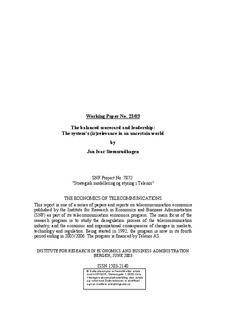| dc.description.abstract | Leadership is about handling change, and the balanced scorecard (BSC) is
frequently seen as an important tool for this type of work. This paper studies
the way in which the executives of the EDB 4tel corporation worked to handle a
multitude of major changes taking place within and outwith their company, and
how the BSC formed part of this work. The study demonstrates that the
management’s change-oriented work centred round their interaction with
surrounding players in their effort to form the company’s strategy, and that the
BSC played no direct part in this process. Nevertheless, the BSC was important
on an indirect level in that it established premises for their change-oriented
work. This paper argues that while information which is of relevance to the
strategy formation effort is embedded in the process of change, it is also a
function of this process, and that consequently, the BSC is best utilized to
provide information about the results of work on change, i.e. the current patterns
of organizational action. | en |
